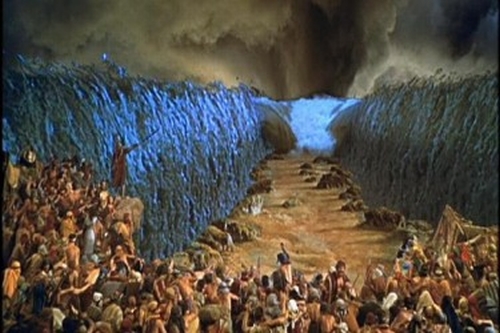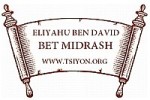|
Set Apart to Deliverance

YHWH said to Moses, “Stretch out your hand over the sea, that the waters may come again on the Egyptians, on their chariots, and on their horsemen.” ..The waters returned, and covered the chariots and the horsemen, even all Pharaoh’s army that went in after them into the sea. ..But the sons of Israel walked on dry land in the middle of the sea.. Thus YHWH saved Israel that day out of the hand of the Egyptians. Exodus 14:26-31
Listen FREE this Sabbath - Next Tsiyon Road Sabbath broadcasting begins December 2, 6 PM, Jerusalem time, and continues for 48 hours. The Midrash is broadcast 8 times over that period.
|
Tsiyon Road Radio on
Glorystar Satellite
Channel 1013
Galaxy 19
Freq: 11836 MHz (V)
Symbol Rate: 20.770 |
TSIYON NEWS
Tsiyon
is presently offering Tsiyon Kingdom Silver
Shekels at a new reduced rate as a fund-raiser
for our ongoing building project. This is a great
opportunity to stock up for the days ahead.
Download your order form at the bottom of this page.
Listener Q&A
Listener Question: Did the Israelites cross
the Red Sea or the Reed Sea?
Upon
leaving Egypt in the Exodus, the Israelites crossed
the Yam Suf, which is traditionally translated in
English Bibles as the Red Sea. This translation,
however, is now said to be in error. Critics say Red
Sea is a corruption of the correct Old English
translation, Reed (Rede) Sea. Moses and the
Israelites never crossed the Red Sea, they say.
Instead they waded through some marshy swamp filled
with reeds. So what was it really: the Reed Sea or
the Red Sea?
Tsiyon Answer:
The Hebrew word
translated red in Red Sea in over 20
verses is translated from the Hebrew word suph,
said by some to be from an Egyptian word meaning
reed. Rashi, the famed medieval Ashkenazi
rabbi is the earliest source I could find for this
translation, in the 10th century AD. However, only
in modern times has this translation become
widespread.
However, this
is not the only possible meaning of the word. Some
authorities suggest suph may be related to
the Hebrew suphah ("storm") or may actually
be soph ("end"), referring to the events of
the Red Sea deliverance of Israel. Here is one such
example:
The
crossing of the sea signaled the end of the
sojourn in Egypt and it certainly was the
end of the Egyptian army that pursued the
fleeing Hebrews (Ex 14:23-29; 15:4-5). After
this event at yam suph, perhaps the verb
soph, meaning "destroy" and "come to an
end," originated (cf. Amos 3:15; Jer 8:13;
Isa 66:17; Psa 73:19). Another possible
development of this root is the word suphah,
meaning "storm-wind"...The meanings "end"
and "storm-wind" would have constituted nice
puns on the event that took place at the yam
suph. [Hoffmeier, James Karl (1999). Israel
in Egypt: The Evidence for the Authenticity
of the Exodus Tradition. Oxford: Oxford
University Press. p. 214]
Whatever the
etymology of the word, the real question is: what
body of water does Yam Suf refer to? We are
not left to guess the answer to this question. From
antiquity Yam Suf has been recognized as
referring to what we today call the Red Sea. The
Septuagint (LXX ) the third century
BC Greek translation, which was translated from
Hebrew into Greek by seventy eminent Jewish sages,
translated Yam Suf into Greek as Erythra
Thalassa literally meaning "Red Sea"! This
leaves nothing to the imagination and serves as a
positive identification of the body of water so
named. Surely, if seventy of the most eminent Hebrew
scholars of 2,200 years ago identified said body of
water as the Red Sea, then why should we have any
regard for the contrary opinions of latecomers
seeking to downgrade the miracle of the Red Sea
deliverance to a shallow swamp of reeds? Further, we
have another ancient witness. Josephus, the
first century AD Jewish historian also
identified Yam Suf as the Red Sea
(Antiquities 2:15:3). The "Red Sea"
translation was universally accepted, being
continued in the fourth century Latin Vulgate, in
which Yam Suf is translated as Mare Rubrum
and Mare Erythrae, both meaning "Red Sea"
(Exodus 13:18). These facts expose the red herring
of a supposed Old English "error" responsible for
the Red Sea translation in English bibles, since the
"Red Sea" translation dates nearly 2,000 years
before any English translation was ever undertaken.
Actually, a
careful study of verses using the words Yam Suf
identify this body of water as the Red Sea. For
example, Solomon is said to have built a navy in
Ezion-geber, approximately modern day Eilat, at the
tip of the Gulf of Aqaba, the northern spur of the
Red Sea.
And
King Solomon made a navy of ships in
Ezion-geber, which is beside Eloth, on the
shore of the Red Sea, in the land of Edom. 1
Kings 9:26
I would add
that it is less than unlikely that Solomon would
have built his royal navy in a swamp! Clearly,
Yam Suf refers to none other than the Red Sea.

Tsiyon
Road on Glorystar Satellite! - Channel 1013
Tsiyon Road Radio
24/7/365 Satellite coverage
for all of North America, Canada and much of South America. Glorystar has made an equipment package
available just for Tsiyon Road listeners. To find out more visit
our special Tsiyon Road page at:
http://tsiyon.glorystar.tv/
Find Tsiyon Road Radio on
Satellite 24/7/365
Satellite: Galaxy 19 - Frequency: 11836 MHz (V)
- Symbol Rate: 20.770
________________________________________________________
Need to talk to us? - In the USA and Canada just call us toll
free at (888) 230-2440 for help. Internationally, email us and we
will arrange a phone or Skype call for you.
________________________________________________________
From Eliyahu
In our modern world differences between people are often considered
a taboo subject, while sameness is celebrated. This attitude is
often projected on God by inane statements like: "God treats
everyone the same." Such statements reveal a profound ignorance of
the Scriptures, where the Creator has a uniquely different role for
everything He has created. We have noted that when YHWH ordered the
world He did so through making divisions. He divided heaven from
earth, light from dark, night from day, the waters below from the
waters above, and the waters from the land. He divided each plant
and animal from every other plant and animal, according to their
kinds, and he even made man and woman distinct from one another, and
each for a distinct purpose. Later on he made each nation distinct
from every other nation, and he made His own nation, Israel,
distinct from all others, for His own special purpose.
By the Ten Plagues YHWH showed Himself distinct from and superior to
all other gods. He also showed Israel to be "His people" when He
brought plagues on Egypt but not on Israel. He made vessels of wrath
for His glory of the unbelieving Pharaoh and Egyptians, while making
His people vessels of His profound mercy. No, the Creator does not
treat everyone the same, nor should He. Rather, He orders all things
through divisions and separations according to distinctions He has
made. In our latest Midrash, as Israel sets out toward freedom in
the Exodus, YHWH separates them from bondage and then from their
enemies, while He separates their enemies from their lives at the
Red Sea. Yes, YHWH is always making divisions and separations,
setting His people apart unto Himself.
Blessings and
Shalom!
Eliyahu ben David
www.tsiyon.org
|
|
©2013 Tsiyon A130-425,
5701 W Slaughter LN, Austin, TX, USA, 78749
Please make offering
checks to: "Tsiyon."
You may leave feedback,
prayer requests and donations online
here. |










